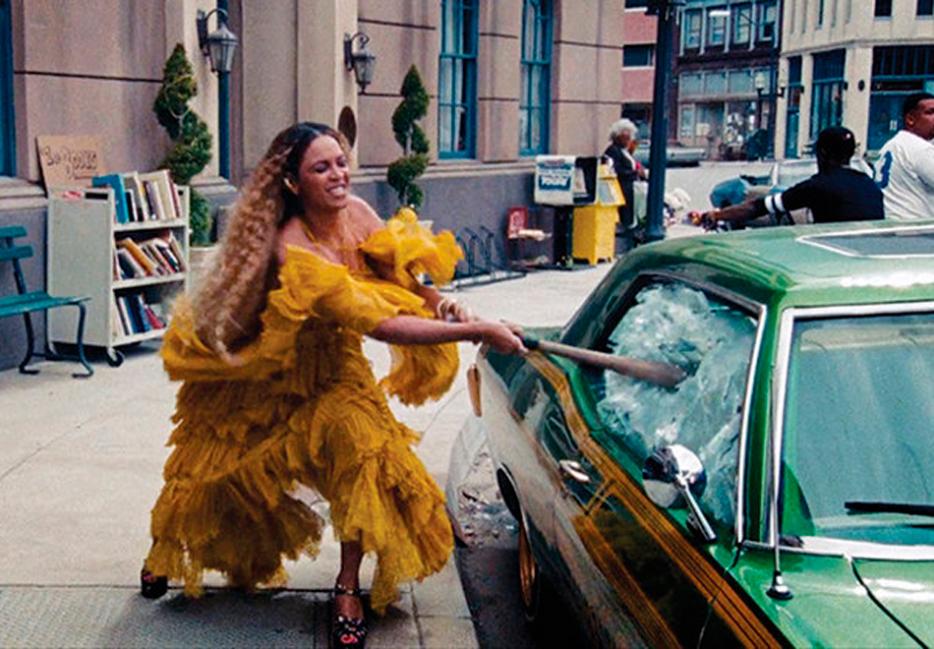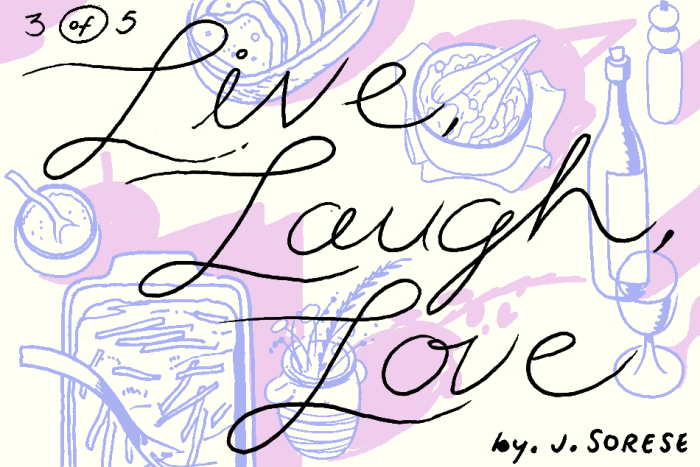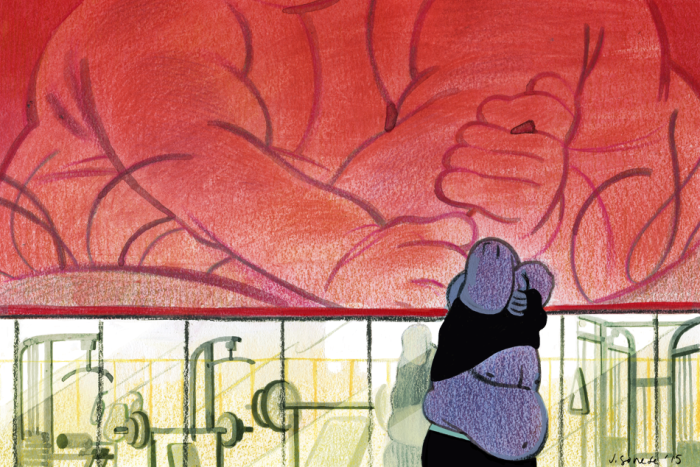The Close Read is a careful look at a component part of a thing we love—a single song, a chapter, a scene, an ingredient—often with some helpful commentary from the creators themselves.
On the cover of one of DC’s Supergirl comics, we see the heroine, Kara Zor-El, in a familiar pop-art position—the supremely gifted woman who is unable to find, trap, and keep a boyfriend. “What’s the point of being Supergirl and helping everyone if I can’t even get a date?” she cries to herself as a small, white cat licks her hand. A small, white cat licks Kara’s small, white hand as she does her best Roy Lichtenstein girl-on-the-verge-of-a-nervous-breakdown-because-of-love impersonation11Lichtenstein’s main reference for his series of Crying Girls were romance comics. Coincidentally, all of Lichtenstein’s inspirations were from DC Comics, the same place that publishes Supergirl. on the cover of her own damn comic book.
Unlike the Lichtenstein images, the Supergirl cover is surprisingly free of the particular cynicism that seems to hang around anything that once felt greenly earnest and naive, but is now placed on a pedestal that gains its legitimacy from feeling like it’s older and woker than any capitalist hoop dream, or market researched spectacle. Rather than bathing in the irony of it all, or setting your phasers to deconstruct, you feel really bad for the beautiful, powerful girl who is not of this world; the lonely blonde22Fortunately, not all lonely blonde girls are white. See: Etta James, Daul Kim for a minute, as well as our woman of the hour—if the rumours are true. who can save us all. If you were one of Kara’s friends, dear reader, you would probably sit her ass down and tell her to listen to some Beyoncé and get over it already.
That same look of elegant distress—you know the one, the tears, the graceful pose of the hand—that expresses itself on the faces of Kara, and Lichtenstein’s Crying Girls, finds its way onto Beyoncé in her 2008 music video for “Why Don’t You Love Me.” Beyoncé’s alter-ego, Sasha Fierce, crams herself into the increasingly uncomfortable mold of suburban kitsch. The song itself serves as a very reasonable reminder of all of Beyoncé’s credentials. When she sings “I got beauty, I got class/I got style, and I got ass,” as well as “I got beauty, I got heart/keep them head in them books, I’m sharp,” she’s not being narcissistic, she’s merely stating a fact. She points out her mastery of money and sex, the only two things that really matter in a capitalist economy. In its way, this song is the obvious analogue to “Hold Up,” from Lemonade, the surprise release that dropped late last month. It’s worth revisiting as perhaps one of the easiest ways to slip into the visual signatures that develop in Beyoncé’s work post-Sasha Fierce. “Why Don’t You Love Me” sees Beyoncé-as-Sasha, the mogul, the self-sufficient one, and the sexiest woman on the street, stuffed uncomfortably into the role of B.B. Homemaker in a way that feels like we’re beginning to finally hit a raw nerve. Parodying home movies, Beyoncé appears on camera with the duty-bound inscrutiability of a political wife who pays for power with toleration, choosing to create Camelot rather than chaos.
On “Hold Up,” Beyoncé sets aside the funhouse mirror of Beyoncé-as-Sasha-Fierce, the propriety engendered by an above-it-all sense of victory or conformity, as well as the idea of merit as a coping mechanism. She does this in favour of presenting a sturdier, quieter honesty. While her voice does not stray from its competent, majestic timbre—the conviction that she’s developed, and that we’ve come to expect—she lets the rasp in. Confidence, it seems, can manifest as a bold, externalized provocation, or finally letting you in on a little secret. This is what Beyoncé feels like sharing on Lemonade: she’s not broken, just tired—and if you listen closely enough, you can hear it. It’s the husk of a voice that’s about to give out after too many sleepless nights. She keeps her range down low, occasionally playfully leaping into the high notes—a send-up of her queen of the world persona. “Hold Up” is one of the few times Beyoncé permits us to hear the ugliness. Wounding relationships can often become the deepest part of you—your reaction to them becomes you. The fantastical specter of Beyoncé is such that it eclipses the woman who exists outside of the image she made for herself. As for Beyoncé Knowles? That’s the woman who seems to let herself have a guest spot on “Hold Up”—flitting between Supergirl and Sojourner Truth, but looking for a sense of clarity regarding a shitty romantic relationship by disappearing into the chorus of a Yeah Yeah Yeahs song.
Beyoncé is unnerved by sharing her vulnerabilities with others, even if that other is herself. And why wouldn’t she be—in a world in which your weaknesses will be exploited just as ruthlessly as your strengths, no shit she’d err towards a cold, clean, calculated image. Actively loving something is a quality we tend to disparage in women for its alleged stupidity. Love is not to be counted on, unlike money—and it’s a cheap sentiment for all the expensive sadness33"Cheap and Cheerful," The Kills. it leaves behind once it goes. Yet, we constantly tell women that without love, they are nothing. For Black women, a lack of love makes one a double nothing, allegedly, if you wish to continue to give credence to the centripital force of our immensely stupid social apparatus. Stuck between jealous or crazy, Beyoncé chooses the one that can’t be so easily dismissed. Crazy gets shit done. Crazy can destabilize. Crazy is the best threat if you know how to use it. Beyoncé will protect what’s hers—which is namely herself, her marriage, her love—with a baseball bat if necessary. After years of putting in time as the good soldier, she’s deciding to fight for herself, but, always behind the cover of her work, the only self she seems remotely comfortable with entrusting to the world.

The general rule for women, if you still believe in such things as general rules, is that you find a man, and you settle down. Maybe have a kid or two. If you’re accomplished, or have a career, that is a plus—but you will never amount to much if you can’t keep the love of a good, bad, or indifferent man.
Due to some grievous error on life’s part (you can call that history, I guess), the general rules for Black women are much more fraught. Work is expected, yet difficult to come by, beauty is often gauged relative to one’s proximity to the pale, narrow glow of some imaginary golden girl, and there are simply way too many travel restrictions. This may seem like the life that most everyone else leads, but when intergenerational trauma, callous disrespect, and the social miseducation of the world at large remain stones in the dress, you start to see why so many people are drowning rather than swimming.
Malcolm X’s assertion, so deftly sampled on Lemonade, is the argument that “there is no one more disrespected than the Black woman.”44See: Lil' Kim admitting the source of her physical insecurities on record. Rochelle’s hair being compared to pubic hair in The Craft, Sarah Baartman, etc. Or, if we like to hear from people in their own words, here are Sojourner Truth’s in her “Ain’t I a Woman” speech given a century before Malcolm’s:
That man over there says that women need to be helped into carriages, and lifted over ditches, and to have the best place everywhere. Nobody ever helps me into carriages, or over mud-puddles, or gives me any best place! And ain't I a woman? Look at me! Look at my arm! I have ploughed and planted, and gathered into barns, and no man could head me! And ain't I a woman? I could work as much and eat as much as a man—when I could get it—and bear the lash as well! And ain't I a woman? I have borne thirteen children, and seen most all sold off to slavery, and when I cried out with my mother's grief, none but Jesus heard me! And ain't I a woman?
That is more than we could ever reasonably expect any person to bear. Truth’s experiences, along with the long inheritance of history, are why efforts on the part of Black women are called herculean. The hero that gives this descriptor its name was, coincidentally, the demi-god Herakles. After going insane, and irreparably fucking some shit up, Herakles performs his labours for some middling, asshole king so that he can be redeemed. Sojourner Truth performed her labours because she was forced to, and after all that, she got herself to a Women’s Convention in Akron, Ohio, got up on stage, and said something meaningful, despite having endured an experience that, were it not classed under the economic order of things, would be seen as a war crime. Herakles’ story follows a fairly typical arc, like so many hero stories before and after it: the gifted man who must atone for an excess of action, a misuse of power. Truth’s arc, and the arc of women who can trace themselves back to her, is a little different, in part because it reveals the unbearable paradox of Black being as created/inherited/perpetuated by people who do not have to live as Black beings unless the current fashion permits: one must atone for the embarassing inability of one’s ancestors to either win a war, make a treaty, or run away fast enough. Only losers get enslaved. Winners get to build Versailles. Got it?
Like any artist with a fondness for puzzles, codes, games, and aphorisms, she drops clues to test the astuteness of her audience.
To win the glory of full humanity, it seems, one must exert the same level of effort as a mythical Greek hero. No person on earth can claim divine parentage like Herakles, or call themselves a superhero without considerable skepticism. Yet, this level of effort is still generally expected of Black women as the baseline for living your own life. If "herculean" is the adjective that best describes the kind of strength required to exist in such an institutionally adversarial world, then it would be good to be reminded that the word refers back to the required work of a contrite hero who seeks redemption. Also, something to point out: the labours of Herakles entailed killing monsters that until the point of their deaths were deemed unkillable, as well as quite literally holding up the entire world in exchange for a few golden apples … and all of this done for a king who, on his best day, could only really be called aggressively mediocre. This is what it means to come to know yourself through your labour. What happens when you start to poke a way out of that headspace that doesn’t require physically dying? The only alternative to any manner of death (whether it’s an ontic transformation of sorts, or permanently stopping the heart), is quite frankly a fate worse than death: a life where you are continually acted upon, where force is not yours to wield.
In “Why Don’t You Love Me,” Beyoncé channel surfs through the moving images of America’s idealized feminine with the all the professionalism and intensity we’ve come to expect from the Beyoncé show. She plays her pale cards well, yet it’s clear these clothes are costumes. As she inhabits the Carrie Bradshaw fashion plate who can’t quite master an oven or the wholesome notoriousness of the OG bondage pin-up girl, Bettie Page55How many white-girl archetypes do you need me to reference here to convince you that if she feels like it, Beyoncé can be the Orlan of pop stars that our crappy, podunk time deserves?, the camera will cut to her, dressed as a Lichtenstein crying girl, then shift to her dressed as if she were a lingeried Maria Callas. Rosie the Riveter, the naughty librarian. She does her best white girl drag, nailing the doll-eyed, oblivious-on-purpose-yet-still-oh-so-blind insouciance that calls to mind Vivien Leigh’s performance as Scarlett O’Hara. (And Sasha Fierce-era Beyoncé’d get away with it too—were it not for that darn, pesky skin colour! Beyoncé points out that to get mainstream success, she has to play the best white girl you have ever seen, and on “Why Don’t You Love Me,” we see her frustration with that.)
For a woman like Beyoncé, the closest thing the world has to a Herakles, or Kara Zor-El based on mythos alone, her version of slaying monsters might just be winning at capitalism. Insofar as capitalism continues to remain a thing (my kingdom for the day that it’s not, because I can’t work under these conditions!), the only way out of the cage is money. She reminds Jay of it, when she flatly tells him that if he hadn’t “mastered wealth,” none of these women would even look twice at him. The key to understanding Beyoncé’s relationship to Black suffering and oppression then becomes, vis-à-vis her own success, the “Formation” lyric: “the best revenge is your paper.”

Sex can sell anything, even if it forces the idea to hide in plain sight. And in "Why Don't You Love Me," Beyoncé hides the emotion behind that idea: under the clothes, the production, the talent, the groove—look a little closer. See that she furrows her brow, she burns the chicken, and smacks her gum the way that someone would if they were giving you a well-deserved snarl, her eyes defiant, never deferent, even as she showgirl smiles her way through the horror comedy of American homemaking, and the loneliness of love. Yet, underneath all that bravado is a sadness borne of confusion, betrayal, and the desire for recognition—the tell is in her mascara tears.
The proud, jarring, insecure soul of “Why Don’t You Love Me” gets to the place where certain tracks/visuals on Lemonade comfortably reside. It is the portrait of a megastar who can’t quite perform her way into the perfection of life that her audience has come to expect, and she certainly can’t perform her way into a happy marriage, or even into real respect—god knows she tried. To admit that her shit’s fucked up anywhere other than her music would detract from Beyoncé’s mission, which is to keep working.
Beyoncé has always been able to belt out a my-man-done-me-wrong standard with the ease at which some people blink. Yet, a sort of detachment lingers in her voice, even if the immaculateness of technique suggests the contrary. Underneath her showman’s ease, there is an understanding that this is all just business—the point of being an entertainer is to hit all the right notes. If you yearn for something beyond the vocal pyrotechnics and good-feeling, that elusive thing called soul—if you’re searching for the place where her voice breaks and your gut really feels it, that’s harder to locate. But there is nothing vacuous about her restraint. Like any artist with a fondness for puzzles, codes, games, and aphorisms, she drops clues to test the astuteness of her audience. If you look and listen carefully, you will be rewarded. If the song leaves you a little emotionally cold, all you need to do is look in her eyes while she performs for you, and it all comes together. Beyoncé’s strength has always been in her ability to offer you the total package. She is Janet Jackson’s heir apparent, and the executor of Jackson’s aesthetic vengeance.
She lets you hear a little more of herself, if you were still skeptical about her ability to emotionally connect to a song, on “Hold Up.” When she sings here, it is hard to figure out to whom she is singing—Jay? The world? White America?—or whether she is simply rehearsing the things that she can never say out loud, instead preferring the deep cover of art. “Too perfect to feel this worthless,” she says, hinting she’s at the point in her life where keeping the peace, or merely winning the game, is different than finding the just balance. Throughout “Hold Up,” she brings herself back down to the level of human, preferring not to hide behind her credentials, or even her superpowers unless she’s using them to prove a point. Yet, even as she’s getting real with the listener, she reminds you, subtly and skillfully, that she is a pro. When the beat swerves into the syncopated rhythm that is among the more memorable of Beyoncé’s signatures, her voice snaps into that persona. When she sings, “I always keep the top tier, 5 star/Backseat lovin' in the car/Like make that wood, like make that wood/Holly like a boulevard,” with the shift from the beleaguered contemplation of her tone to the tight swagger of some of her greatest bangers and then back again, she’s showing you that above all things, she’s a professional. She does something similar again towards the end where she breaks into her best angelic soprano, only to drop down when she sings “I look in the mirror and say what’s up?” Still pointing out that singing is her work, she gets at something more personal—that even she needs to give herself a pep-talk in the mirror sometimes. Not only is Beyoncé singing about being a woman having to deal with infidelity in her own life, she’s also singing about being trapped in a loveless political marriage wherein she is expected to perform the duties of both superwoman and superstar, while never being allowed to fully transcend into her own realm.
Punctuated by air horns, the soundscape of “Hold Up” is the “save your marriage beach vacation”—the place where frolicking in the blue ocean water feels like a latchkey for love. The imitation of strings (or are they harps?) being plucked feels like she’s walking the tightrope between two emotional extremes—only held together by her desire for clarity. She spins in all directions. Hold up—let’s be rational about this; back up, is this really happening to me? Step down—let’s get off the ledge now: oh down, I don’t think I can stop this from happening. Torn between the desire to entertain, the need to please, and a thirst for retribution, you notice that all of these things have a common source—yearning to be loved for what you are and what you can be, as opposed to merely being tolerated because you fulfill a role, or are socially expedient.
The hollow lushness of “Hold Up”’s sound suggests that the experience of listening to something so island-tinged should fill you to the brim with lazy, loving sunshine, but it all falls apart somehow. There are moments where a rolling percussive starts low and ominous, but trails off. “Something don’t feel right,” she sings, paranoia creeping in, knocking you off balance. If you can’t even enjoy a beach vacation without feeling like somebody’s out to get you, what can you enjoy?
“Hold Up” forces the listener to ask the question that perhaps no listener of Beyoncé, casual and obsessive alike, has ever really bothered to ask: who does Beyoncé Knowles, the woman responsible for bringing Beyoncé into the world, listen to when her entire world is crashing down? The short answer: Karen O. Like anyone who has ever turned a song into a set of marching orders for life, Beyoncé twists Karen O’s pleading resignation into a warning shot.






